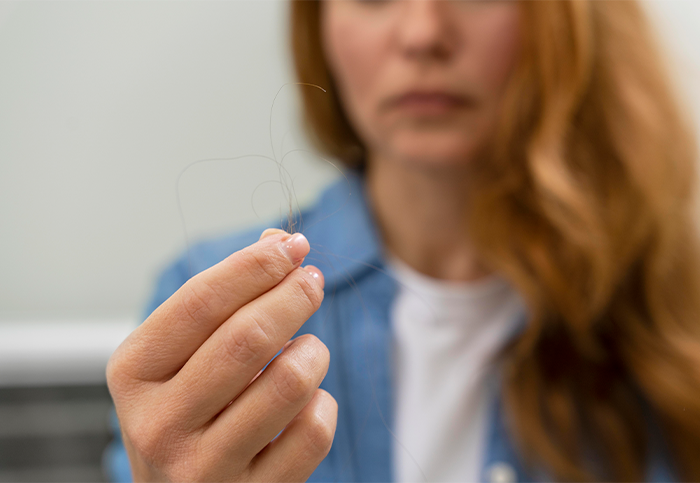Hormonal Imbalance May Cause Hair Loss and Thin Hair
Hair loss is a common problem faced by people of all ages and genders, and it can negatively affect a person's self-confidence. Suppose you are sitting in the office, finger-combing your hair to refresh them, but what do you see? There is nothing but a heap of hair in your hands; some may also fall on your shirt. How upsetting it would be!

But the goodness is that reducing excessive hair fall is not undoable. With the advancement of scientific research, you can do it! You just need to figure out if the underlying cause is a hormonal imbalance or any other problems causing excessive hair fall, hair loss, and hair thinning.
Why is Hormonal Balance Important in the Body?
Hormones are responsible for many bodily functions, including hair growth. When these hormones become unbalanced, they can disrupt the body's normal hair cycle and lead to hair loss. The two hormones that are most commonly linked to hair loss; are testosterone and dihydrotestosterone (DHT). When these hormones become unbalanced, they can cause the hair follicles to shrink, increasing the shedding and thinning of hair.
Causes of Hair Loss
In addition to hormonal imbalance, other factors such as stress, poor nutrition, and certain medications can also lead to hair loss. Stress, in particular, can have a significant impact on your hair health, as it can lead to a disruption in your body's normal hormonal balance. In addition, poor nutrition can also lead to the depletion of the nutrients that are necessary for healthy hair growth.
How To Reduce Hair Fall Issues?
Fortunately, there are steps that can be taken to help reduce the effects of hair loss caused by hormonal imbalance. One of the best ways to do this is to ensure you get the proper nutrition. This includes eating a balanced diet with plenty of fruits and vegetables, lean protein, healthy fats, and complex carbohydrates. Additionally, taking a multivitamin and a good quality food supplement can help reduce hair fall issues.

Best Supplements for Hair Health
Another way to reduce the effects of hair loss due to hormonal imbalance is to supplement your diet with Nutrifactor's best hormonal balance and hair care supplements.
1. Biotin Plus is one of the best hair health supplements; it is a blend of biotin and folic acid that has been shown to help promote healthy hair growth. Biotin, in particular, is significantly effective at increasing hair growth and strengthening hair follicles. Folic acid also helps regulate healthy cell division and restore normal hair health.

2. If you are particularly deficient in biotin, consider taking the premium quality and pure biotin supplement of Nutrifactor, Nutin, which contains 2500 mcg of biotin to help fulfill your deficiency.
3. The third amazing supplement for hair health is Maxzoom, which promotes thicker and healthier hair. It contains essential vitamins & minerals, along with MSM (Methylsulfonylmethane), a proven ingredient for hair health, promotes hair growth, and gives a lustrous look.
4. Besides these haircare-specific supplements, there are a couple of hormonal-related supplements, Femrose Evening Primrose Oil and Femrose 500 halal soft gels, which help balance the fluctuating hormone levels (hormonal imbalance) in the body.

If hormonal imbalance and PCOS are the causes of hair loss and hair thinning, then first resolve these underlying causes, and your excessive hair loss will be reduced. Consider taking the hormone-related supplements mentioned above with the consultation of your healthcare professional. Androgenic alopecia is a specific type of hair loss around the temple caused by PCOS.
In conclusion, taking a balanced diet, adopting an active lifestyle, and taking Nutrifactor's hair health supplements and hormone-related food supplements (if the cause is hormonal imbalance) can restore hair health by reducing hair fall.
References:
- https://www.ncbi.nlm.nih.gov/pmc/articles/PMC7432488/
- https://www.mayoclinic.org/diseases-conditions/hair-loss/symptoms-causes/syc-20372926
- https://www.webmd.com/skin-problems-and-treatments/hair-loss/understanding-hair-loss-basics



